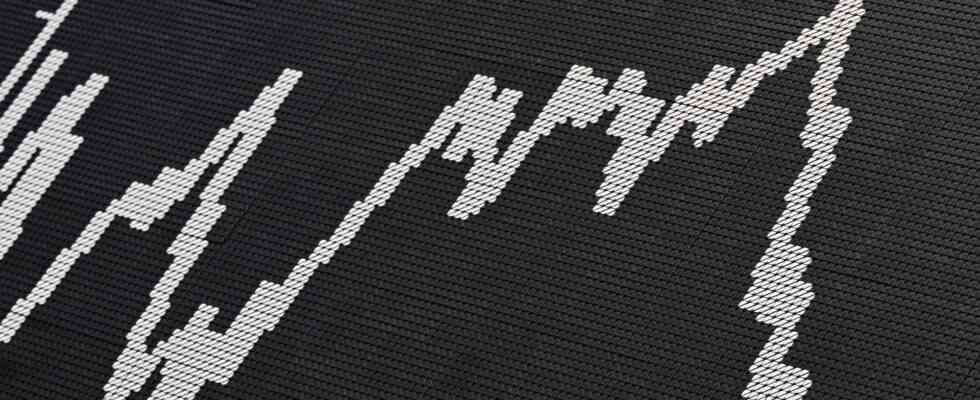market report
Status: 05/31/2022 12:40 p.m
Ever-increasing inflation and the sharp rise in oil prices are keeping investors from buying shares today. Investors will probably have to brace themselves for an imminent rate hike by the ECB.
The DAX lost around 0.8 percent and at times fell to 14,442 points. After the last few trading days had pushed it to the 14,600 mark, investors are pulling out of riskier assets today. The leading German index closed yesterday with a plus of 0.8 percent to 14,575.98 points.
Eurozone inflation at record high
In view of the German inflation data published on Monday and the current data from the euro zone, fear of inflation is a braking factor for the stock market today. The surge in energy prices is driving inflation in the area of the common currency to a new record high: Goods and services cost an average of 8.1 percent more in May than a year ago. This exceeds the forecasts of the experts.
“I don’t understand why the ECB wants to wait until the end of the third quarter to abolish its negative interest rates. Every new inflation figure shows how risky this hesitation is,” says Jörg Krämer, chief economist at Commerzbank.
Perhaps the hesitation won’t last too long. French central bank governor Francois Villeroy de Galhau said May’s inflation numbers gave the European Central Bank renewed plans to end its very loose monetary policy. “Progressive and consistent monetary policy normalization” is necessary, he said today.
Embargo drives up oil prices
Oil prices, which have risen again, are also having a negative impact on the markets. Today they are at their highest level for a good two months. The prospect of a reduced supply from Russia as a result of new sanctions from the European Union because of the Ukraine war is acting as a price driver. “The last thing the stock market needs right now is a price explosion in the area of 140 or 150 US dollars,” comments Jochen Stanzl, chief market analyst at CMC Markets.
The EU countries had agreed on a compromise in the dispute over the planned oil embargo against Russia. At Hungary’s insistence, only Russian oil deliveries by sea are to be stopped for the time being.
Raid on Deutsche Bank and DWS
The headquarters of Deutsche Bank and its subsidiary DWS are searched. A spokeswoman for the public prosecutor’s office in Frankfurt confirmed the corresponding media reports. According to the “Handelsblatt”, the searches are related to the so-called “greenwashing” allegations against the asset manager DWS. “We have continuously and extensively engaged with all relevant regulators on this matter and will continue to do so,” said a DWS spokesman. No comment was initially available from Deutsche Bank.
DWS hit the headlines last year after allegations that the asset manager was too lax with the criteria for “green” investments and had engaged in so-called “greenwashing”. DWS has always denied the allegations.
China rebound for auto stocks
The prospect of government sales subsidies for certain cars in China gave German automakers shares a boost today. The Chinese Ministry of Finance had previously announced that it would halve sales tax on low-emission vehicles with a retail price of up to 300,000 yuan (around 42,000 euros). This affects cars that are sold from June to December.
Vitesco and Infineon cooperate
The automotive supplier Vitesco is strengthening its electromobility business with a cooperation with the semiconductor manufacturer Infineon. This is about silicon carbide power semiconductors, Vitesco announced in Regensburg. These semiconductors made a significant contribution to the efficiency of electronics for up to 800 volts, thereby increasing the range of electric vehicles. Financial details of the cooperation were not given.
Foxconn expects improvement in supply chains
The Apple supplier Foxconn expects the supply chain problems to ease in the second half of the year. “We are quite confident in the stability of our supply chain for the second half of the year,” said Foxconn CEO Liu Young-way. Foxconn aims to become the first electric vehicle (EV) maker “that is not short of material supplies,” Liu said, citing the global semiconductor shortage. The Taiwanese company aims to capture around 5 percent of the global electric vehicle market by the end of 2025 and hopes to increase its capacity to manufacture EV chips.
Lanxess acquires division of Dutch DSM with Advent
The specialty chemicals group Lanxess, together with the financial investor Advent, is taking over the plastics business of the Dutch chemical company DSM for around 3.7 billion euros. This is to be incorporated into a new joint venture in which Advent will hold at least 60 percent and Lanxess will hold up to 40 percent, as the Cologne-based group announced. Lanxess will also transfer its business with high-performance polymers, which are mainly used in the automotive industry, to the joint venture and will receive a payment of at least 1.1 billion euros.
Credit Suisse wants more capital
According to insiders, the crisis-ridden Credit Suisse is examining measures to strengthen capital. The considerations are at an early stage, two people familiar with the situation told Reuters. One option is a capital increase. Such a transaction would probably take place in the second half of the year. According to the insiders, the bank not only wants to pad the balance sheet with a capital increase, but also wants to send a positive signal to the outside world. Because if well-known investors gave the bank fresh capital, that could be seen as a vote of confidence.
Deloitte: Companies expect inflation to remain high
Inflation worries German companies. CFOs of large companies surveyed by the management consultancy Deloitte expect prices to rise by more than six percent over the next twelve months. The long-term consequences of increased energy, transport and commodity prices determined the agenda of many companies, said Deloitte chief economist Alexander. For more than three quarters of the 143 CFOs surveyed, geopolitical risks and rising energy costs were among the top risks for their company over the next 12 months.

